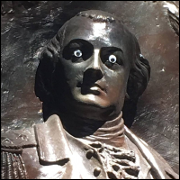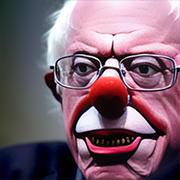|
This is actually a tough election. Picking a Confederate for your VP is unacceptable.
|
|
|
|

|
| # ? May 10, 2024 13:33 |
|
A Confederate, but an explicitly-okay-with-socialists Confederate. If anything could get goons to make an exception, surely it's that.
|
|
|
|
well theres also that charles guiteau has no reason to shoot weaver
|
|
|
|
Can't vote for any tickets that would deny us alcohol, civil rights, or Chinese immigration. With a heavy heart, I must send Garfield to his doom.
|
|
|
|
reignonyourparade posted:A Confederate, but an explicitly-okay-with-socialists Confederate. If anything could get goons to make an exception, surely it's that. Suffer not the South.
|
|
|
|
Yeah, I was all for Weaver, but his running mate's a non-starter for me. May Garfield bring us a glorious two terms crusading against the hated Mondays!
|
|
|
|
I think McKinley is going to end up being the only president we save from the assassin's bullet. I wonder what poor progressive bastard is going to be on the receiving end of Czolgosz. Bryan perhaps.
|
|
|
|
Weaver historically lives till 1912. Guiteau felt personally wronged by Garfield and there’s no reason to think he would have shot any other president. I think we’re safe from the rebel menace. Mantis42 posted:I think McKinley is going to end up being the only president we save from the assassin's bullet. I wonder what poor progressive bastard is going to be on the receiving end of Czolgosz. Bryan perhaps. McKinley has to take a bullet so that TR may rise from his funeral pyre.
|
|
|
|
Mantis42 posted:I think McKinley is going to end up being the only president we save from the assassin's bullet. I wonder what poor progressive bastard is going to be on the receiving end of Czolgosz. Bryan perhaps. It's not in QuoProQuid's rules for someone to get someone else's death, as I understand it. So Bryan is safe from Czolgosz.
|
|
|
|
Mantis42 posted:I think McKinley is going to end up being the only president we save from the assassin's bullet. I wonder what poor progressive bastard is going to be on the receiving end of Czolgosz. Bryan perhaps. I dunno, I figure there's a good chance Kennedy will lose to some minor Socialist party. Pakled has issued a correction as of 05:32 on May 9, 2016 |
|
|
|
A vote for the Greenbacks is a vote against the Chinese. A vote for Garfield is a vote against patronage. Do the right thing and end corruption. The more you read about Charles Guiteau, the more hilariously bonkers he gets. Wikipedia posted:Guiteau became something of a media sensation during his entire trial for his bizarre behavior, which included him frequently cursing and insulting the judge, most of the witnesses, the prosecution, and even his defense team, as well as formatting his testimony in epic poems which he recited at length, and soliciting legal advice from random spectators in the audience via passed notes. He dictated an autobiography to the New York Herald, ending it with a personal ad for "a nice Christian lady under 30 years of age". Also, the real reason for Garfield's neverending nap: quote:Upon his autopsy it was discovered that Guiteau had the condition known as phimosis, an inability to retract the foreskin, which at the time was thought to have caused insanity that led him to assassinate Garfield.
|
|
|
|
im going back to the republicans for this one i did not know that phascinating phimosis phact
|
|
|
|
Pakled posted:I dunno, I figure there's a good chance Kennedy will lose to some minor Socialist party. Or to Nixon! *click*
|
|
|
|
Neal Dow is the clear civil rights choice. Former Underground Railroad conductor is pretty bad-rear end. And come on, this nation will never actually ban alcohol. It would jump-start a black market the likes of which hasn't been seen since Blackbeard. I am still incensed at how my Grand Old Party gave in to a Corrupt Bargain, and I won't forgive Garfield his opposition to the Ku Klux Klan Act. Garfield may be unlikely to offend anyone, but this nation still must root out the legacy of slavery. Dow for President.
|
|
|
|
Don't let Neal Dow take my HARD CIDER away
|
|
|
|
Garfield would've gone on to pretty good things. Also, voting for our Dude Vice President http://deadpresidents.tumblr.com/post/335481176/the-elegant-mr-arthurIt quote:It was about two hours after midnight on September 20, 1881, and not unusual for the resident of 123 Lexington Avenue in New York City to be up at such a late hour, or to have plenty of guests. In fact, he preferred to keep late hours, entertaining friends deep into the night with late-night dinners, drinks, and endless conversation. Yet, on this night, 123 Lexington Avenue was somber and the mood was grave. Just a few hours earlier – at 11:30 PM – a messenger knocked on the door of Vice President Chester Alan Arthur’s Manhattan brownstone and handed Arthur a telegram. Surrounded by a few friends and colleagues, Arthur read that President James Garfield, just 49 years old and in office for barely six months, had died in a beach cottage at Elberon, New Jersey. Turning to his friends in his sitting room, Arthur said, “I hope – my God, I do hope it is a mistake." Edit: Today I learned that Grant invited Robert E Lee to the White House in 1869, make of that what you will.
|
|
|
|
I'm voting for Garfield solely so this Kate Beaton comic still exists in our timeline.
|
|
|
|
Arthur, so called "anti-Chinese exclusion" was the one who ended up signing the Chinese Exclusion Act.
|
|
|
|
Corek posted:Arthur, so called "anti-Chinese exclusion" was the one who ended up signing the Chinese Exclusion Act. Arthur vetoed the original version of the Chinese Exclusion Act, which would have banned all Chinese immigration for twenty years and denied citizenship from all people of Chinese descent currently living in the country. He had to negotiate Congress down to a ten year ban. Here is Arthur's justification for the veto. QuoProQuid has issued a correction as of 20:48 on May 9, 2016 |
|
|
|
karmicknight posted:As I cannot in good conscience suffer a confederate to live, let alone take one of the offices held by the Father of the Nation John Adams. Also, James Garfield is probably my Congressman, so there's no way I can vote against that much of a hometown hero, and his policies aren't terrible! The first episode of The Dollop I ever listened to was the one on Charles Guiteau, and lemme tell you, it's a hell of a doozy
|
|
|
|
Takin a gamble on the greenback crew.
|
|
|
|
QuoProQuid posted:Arthur vetoed the original version of the Chinese Exclusion Act, which would have banned all Chinese immigration for twenty years and denied citizenship from all people of Chinese descent currently living in the country. He had to negotiate Congress down to a ten year ban. https://books.google.com/books?id=l...0arthur&f=false (The Onion used to have this online but they took it down) Corek has issued a correction as of 02:56 on May 10, 2016 |
|
|
|
I feel like Guiteau was nuts and is going to shoot the president no matter who we elect, so if you want to use your cheater future knowledge, you have to just pick your favorite VP. Garfield's a good man with good policies. I've also noticed that a lot of these goon dream candidates tend to be weirdly quiet on southern issues, which is a luxury you get when you're not a serious party that's actually playing to win. It's the same as tacitly saying "let the south be as the south does, so long as they don't bring their problems up here." I'll go for the one who is explicitly against Jim Crow in his platform, thanks.
|
|
|
|
Garfield and Arthur both spend most of their terms dying, so how badly could they possibly screw up
|
|
|
|
Daniel Webster could was offered the vice presidency by William Henry Harrison, but he viewed it as a dead‐end position and declined in favour of Secretary of State. Harrison died 32 days into his term. Seven years later, Webster was offered a position as Zachary Taylor’s VP. He once again declined. Taylor, as you may recall, was the second president to die in office.
|
|
|
|
Votin' fer the Greenbacks, metal money worst money Also poo poo, this election was supposed to be called last Sunday?
|
|
|
|
Nebakenezzer posted:Votin' fer the Greenbacks, metal money worst money Ops had a lot on his plate, have faith.
|
|
|
|
Nebakenezzer posted:Votin' fer the Greenbacks, metal money worst money I got a new job. Update will be up Sunday.
|
|
|
|
This thread introduced me to both Hamilton and the Dollop so even if it dies along with the Republic in the impending Greenback Wars I am very happy I clicked on it.
|
|
|
|
QuoProQuid posted:I got a new job. Update will be up Sunday. WHERE'S MY PA
|
|
|
|
Its historically accurate for election season to get longer and longer with each update.
|
|
|
|
Would've voted Weaver but prohibition is a menace we must defeat. Garfield it is then!
|
|
|
|
So I assume the pro-segregation candidates won every election until the present since our reins were taken away?
|
|
|
|
 THIS ELECTION IS RIGGED THIS ELECTION IS RIGGED  An URGENT message to all true sons of  Liberty Liberty  A great conspiracy seeks to deny the honorable JAMES A. GARFIELD from winning this election. The right villainous forces of FIAT CURRENCY, CORRUPTION, and FREE TRADERS (more like free-traitors, ought I be called correct) seek to undermine this just man AND his vallient beard! THE ELECTION HAS NOT BEEN CALLED, so that foul misdeeds can be done to our sacred ballots! GOD'S WOUNDS! Did we not fight the British, then the Freemasons, then the Catholics, then the South, for this hallowed privilege? What Donkey-faced poltroons they must think we are, to have payed in blood for something we now will sit back and not collect! I bring ALARM, friends, but also hope! I have set up a benevolent organization specifically to correct this injustice. What this "Sons of Liberty and Freedom for the election of that one guy I cast my ballot for" requires from you is firstly, Money. Secondly, your voice. Thirdly, your back to labor in the cause. United, we can uncover the fornication between the laborer and the farmer's daughter in the hayloft of Lincoln. We can run into the parlor and tear down the heavy curtains of obscurity, exposing the foul matrons of corruption taking their daily laudanum dose. We will have a MEETING in the TOWN SQUARE this Sunday, with SPEECHES and HARD CIDER, left over from the days of Harrison. Sitting for decades in ware-houses in Maryland, it has now fermented itself into a drink not unlike whiskey in strength. LIKE OUR RAGE! If you, friend, cannot join us and have but a little money, you can still help. I have secured a copy of HOW TO WRITE TELEGRAMS from the government office of telegraphy, and will attach it here: http://www.telegraph-office.com/pages/telegram.html Use this space, formerly for FREEDOM, to protest in telegraphic form, your rage that this election has not produced a result. One can sent a telegraph message to ANY TELEGRAPH STATION general delivery, and it will be posted in full public view in the office you sent it to. Compose and send as many telegraphs as possible! Repeat the best, pithiest messages to different stations! FREEDOM IS IN YOUR HANDS, AS A FATHER HOLDS HIS CHILDREN Let the Smashed Telegraph be our symbol! Let the message of Freedom be spoken with intricate code words and ornate stops! THE TRUTH IS OUT THERE! TRUST NO ONE Could even Chester A. Arthur be involved
|
|
|
|
Nebakenezzer posted:The right villainous forces of FIAT CURRENCY, CORRUPTION, and FREE TRADERS (more like free-traitors, ought I be called correct) seek to undermine this just man AND his vallient beard! verily, you ought be called correct
|
|
|
|
alas, I am a sodomist
|
|
|
|
Nebakenezzer posted:
Lies. Dirty, filthy, lies. We will not stand for this slander. Thank you for voting. After a brief interregnum, the Republican Party has once again seized control of the White House. James A. Garfield, president-elect, has promised to use his broad popular mandate to pursue reform and abolish the practice of patronage. We wish him the best of luck in this endeavor and are confident that he will succeed in ending the rampant abuses of the past feew years. Serving alongside Garfield is Chester A. Arthur. So long as Arthur can avoid scandal or death, his vice-presidency will be one of the most successful in decades. MOST POPULAR TICKET: James A. Garfield / Chester A. Arthur (Republican) - 41 votes (55.4%) James B. Weaver / Barzillai J. Chambers (Greenback) - 28 votes (37.8%) Neal Dow / Henry A. Thompson (Prohibition) - 4 votes (5.4%) Winfield S. Hancock / William H. English (Democratic) - 1 vote (1.4%) TOTAL: 74 votes
|
|
|
|
ELECTION OF 1884 Click here to vote in the (much-delayed) Election of 1884! Click here to vote in the (much-delayed) Election of 1884!ELECTION WILL CLOSE 3 JUNE 2016  Background: When James Garfield was shot, people mourned, not only because of what he could have achieved, but because of what they thought would come after. After Abraham Lincoln’s assassination, he was succeeded by a barely literate incompetent who threatened to destroy the newly saved union. When Garfield was assassinated, it seemed as though the presidency would be left in the hands of a machine politician that embodied all the problems of the previous administration. To the surprise of his contemporaries, Chester Arthur proved his enemies wrong. Though he shook aside Garfield’s promises of a non-partisan bureaucracy, Arthur proved to be a competent administrator. His embrace reform helped address the worst abuses of the Grant and Hayes Administrations and his willingness to buck Republican orthodoxy allowed the country to recover both economically and militarily. Under the Arthur Administration, the United States began to emerge as a major world power. Unfortunately, Arthur was not able to transform his apparent successes into a serious bid for a full-term. Though he briefly sought the Republican nomination, his health declined dramatically during the last year of his presidency. Famed General William Tecumseh Sherman was considered as a possible alternative, but the general pledged that he would not “accept if nominated and [would] not serve if elected.” Thus, the nomination passed to Arthur Blaine, Speaker of the House. While Blaine was popular among his supporters, his nomination proved to be instantly divisive, with the sitting president doing all but endorsing his rival. On the Democratic side, Grover Cleveland was immediately nominated. Known for “his integrity and judgement and iron will,” Cleveland proved to be a unifying figure for the party. Under his guidance, the Democrats embraced a long platform that emphasized the need for change from the days of Republican dominance. Cleveland emphasized the corruption and duplicity of the Republicans after almost two decades of control. This decision has transformed the Election of 1884 into one of the dirtiest elections in American history. Blaine has a reputation as a symbol of corruption. He is widely believed to be in the pockets of the railroad companies and several letters have surfaced showing Blaine influencing legislation to promote their cause. One reporter has described Blaine as “wallow[ing] in spoils like a rhinoceros in an African pool." Meanwhile, Cleveland has been beset by allegations about his personal morals. After an extensive investigation, a Buffalo newspaper has accused Cleveland of violently raping a woman, and then using his authority as sheriff to have her sent to the insane asylum. While the Democrats have been able to shield themselves from the worst of the fallout by destroying the woman’s reputation and portraying her as a greedy prostitute, the incident still poses serious questions about Cleveland’s judgement. To the great luck of Cleveland, however, the public’s attention has recently turned away from Cleveland’s failings to Blaine’s. During one of his sermons, Samuel Burchard, Protestant minister and Blaine supporter, described the Democrats as the party of “rum, Romanism, and rebellion.” Blaine was present to hear the allegation but did nothing to disassociate himself from the allegation. The incident has left many voters convinced that Blaine is opposed to urban immigrants, opposed to religious minorities, and opposed to the South. DEMOCRATIC PARTY NOMINEES:  Presidential Nominee: Grover Cleveland
 Vice-Presidential Nominee: Thomas A. Hendricks
REPUBLICAN PARTY NOMINEES:  Presidential Nominee: James G. Blaine
 Vice-Presidential Nominee: John A. Logan
PROHIBITION PARTY NOMINEES:  Presidential Nominee: John St. John
 Vice-Presidential Nominee: William Daniel
GREENBACK/ ANTI-MONOPOLY PARTY NOMINEES:  Presidential Nominee: Benjamin Franklin Butler
 Vice-Presidential Nominee: Absolom M. West
QuoProQuid has issued a correction as of 23:39 on May 26, 2016 |
|
|
|
Geez, what a terrible slate of candidates. This'll have to be a Prohibition vote more or less by default.
|
|
|
|

|
| # ? May 10, 2024 13:33 |
|
Actually I think Benjamin Franklin Butler looks pretty good. His VP is a poo poo, but really who cares about the VP as long as the President doesn't die in office. EDIT: Well, less good now that I bothered to read his biography. Still, the past is the past, and I like his platform in the present time of 1884. Mountaineer has issued a correction as of 14:28 on May 26, 2016 |
|
|


























